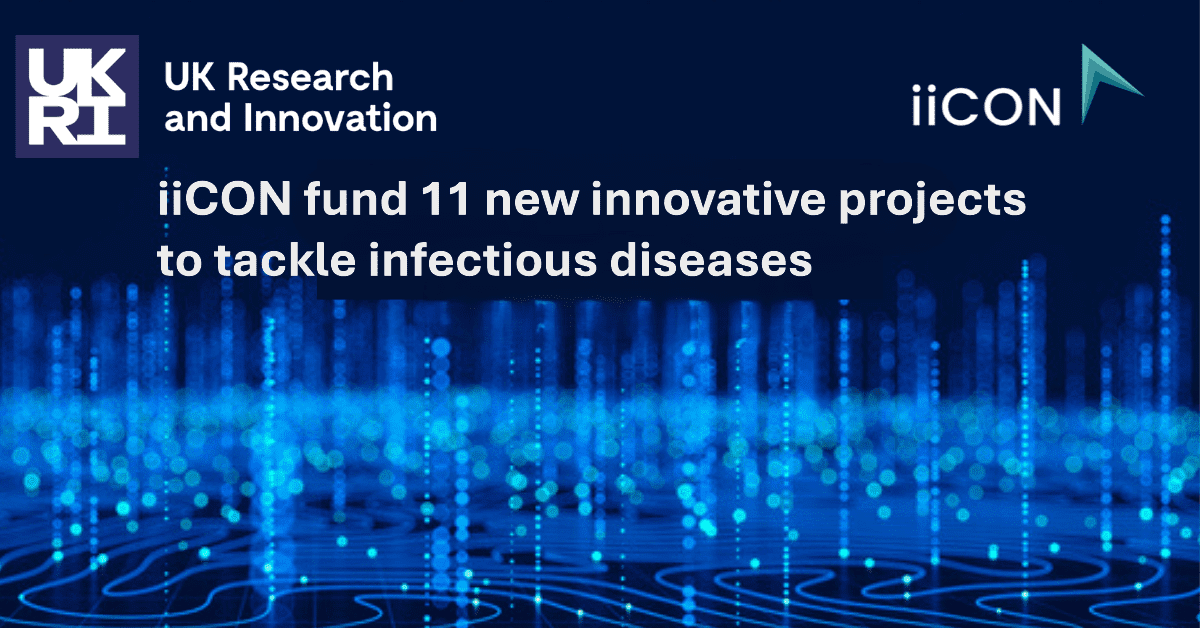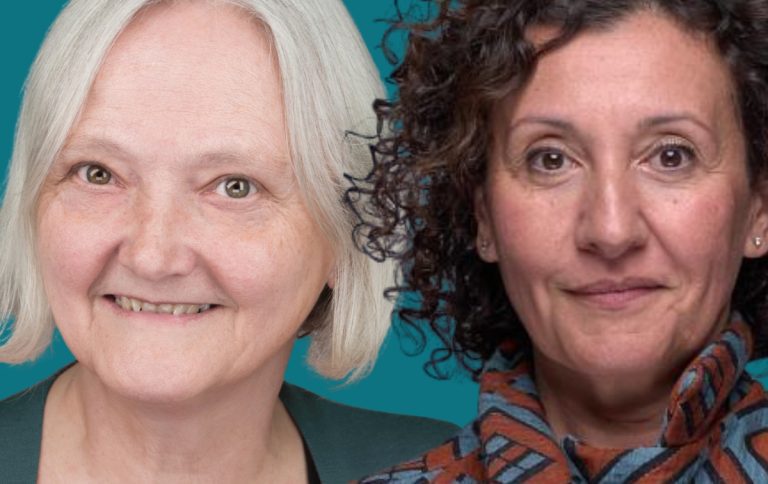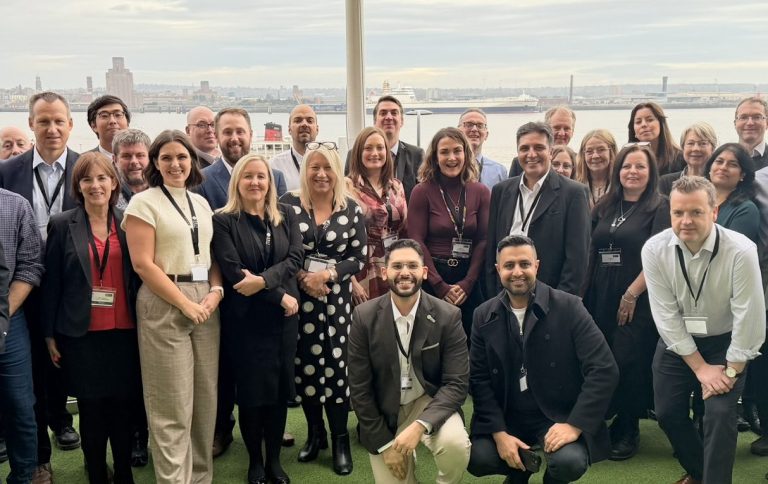- Find our latest Case Studies
- Our Platforms
iiCON funds 11 new innovative projects focused on tackling infectious diseases

After successful sandpit events in Liverpool and London earlier this year, iiCON is excited to announce 11 new projects. These projects are focused on combating infectious diseases and have received a share of £1.5 million in funding from the UKRI as part of its ongoing work to support innovative ways of tackling infections.
The projects are:
Development of a scalable blood test to determine heterosubtypic immunity to avian influenza
Avian influenza viruses pose a significant pandemic threat to the human population. Recent reports of H5N1 spread amongst cattle herds in the US have increased concerns that viral mutations may facilitate animal-to-human and ultimately human-to-human transmission. If this situation occurs, it remains unknown whether pre-existing immunity, developed from prior exposure to related influenza infections and/or influenza vaccination, would prevent any significant impact on humans.
Immunity tests are often heralded as “game-changers” in understanding population risk from infectious diseases; however, these tests largely focus on antibody responses and are often inaccurate. Instead, recent academic reports demonstrate that protection from influenza relies on certain cells of the immune system, called ‘T cells’.
During the COVID-19 pandemic, ImmunoServ developed the world’s first standardised, scalable blood test to measure an individual’s T cell response (called the ‘Immuno-T’ test). The test identified individuals most at-risk from SARS-CoV-2 infection, based on the presence of T cells responding to the SARS-CoV-2 virus.
This project will use the ‘Immuno-T’ platform to develop a scalable blood test that measures T cell responses to H5N1 avian influenza. Once optimised, 100 donors from across the UK will be recruited to a pilot immunity study to assess pre-existing T cell responses to H5N1, using blood collected by the individual at their home and shipped to the lab.
Data obtained from this test will help determine population immunity to future threat of H5N1. This will inform policy decisions by public health bodies and allow vaccine manufacturers to better assess induction of protective immune responses by avian influenza vaccines.
Use of novel technologies to tackle infections: a one stop sputum-free diagnosis for Tuberculosis
Tuberculosis (TB) remains a critical global health issue and is one of the leading causes of death worldwide. Current diagnostic methods for TB rely on sputum tests, which pose several challenges, particularly for patients who cannot produce sputum or live in areas where testing facilities are not accessible. These issues are exacerbated in patients co-infected with HIV and in children, who are at higher risk of developing active TB but often cannot expectorate sputum. The World Health Organization (WHO) has identified the urgent need for rapid, accurate, non-invasive, and sputum-free diagnostic tests for TB. However, the development of these new diagnostic tests is hindered by the lack of suitable biomarkers.
To address this gap, our project will use TB infectious disease as a proof of concept to develop a pipeline for biomarker discovery and test development. We will use state-of-the-art proteomic and sequencing approaches to identify urinary biomarkers associated with active TB by analysing the proteomic and genomic data from urine samples, we aim to discover novel urinary biomarkers that can serve as the basis for developing new diagnostic tests. In collaboration with the Technology Innovation Centre at the University of Strathclyde, we will use these discovered biomarkers to develop pilot test prototypes utilising advanced biosensor technology. This novel approach aims to develop a point-of-care test that is portable, rapid (within 1 hour), accurate, and non-invasive, enabling selective biomarker detection in patient urine. This addresses the critical needs identified by the WHO and provides a viable solution for TB diagnosis in resource-limited settings
An open innovation network to drive commercialisation of microbiome research
The UK has considerable underpinning microbiome R&D capacity and capability, including the Microbiome Innovation Centre (MIC), yet many innovations fail to realise their full potential because we lack the technology transfer and business development support needed to translate research to clinical or commercial impact. In this project our goal is to define better ways to deliver greater clinical and commercial impact from microbiome research.
Building upon recommendations from previous microbiome networks, strategic roadmaps and stakeholder workshops, we will run follow-up workshops to characterise barriers in greater depth then propose specific technical, infrastructure, support or other remedies. Outputs will later be leveraged to establish a comprehensive Open Innovation ecosystem of technical, commercial and regulatory partners who can provide technology transfer and business development support all along the pathway from microbiome research to the clinic or market, driving growth in UK PLC and attracting industry from overseas.
Improving knowledge of antibiotic use and antimicrobial resistance in migrant, refugee, and asylum seeker populations in Liverpool through community-based participatory research
Previous studies in the global south demonstrate the benefit of community engagement principles in addressing AMR at the community level. These approaches are particularly relevant for disadvantaged and marginalised communities; however, attempts by public health bodies in the UK to engage these communities in the design of health information, education and communication (IEC) are typically restricted to top-down consultative approaches and fail to fully incorporate the lived experience of affected communities in public health activities.
To maximise the benefits of community engagement in the context of antimicrobial resistance (AMR) an evidence-based approach is required that supports shared learning and equitably engages communities in the design and evaluation of knowledge and behaviour change interventions. Migrant, refugee and asylum seeker communities often obtain non-prescription antibiotics from overseas pharmacists, family shipments, or online orders. These behaviours are driven by experience of antibiotics as a “quick fix” to care in fractured and under-resourced health systems. MRAs are also particularly vulnerable to rising AMR due to high rates of infection and barriers to healthcare in their host country.
This project will deploy a tried and tested Community-Based Participatory Research model to improve MRA knowledge of antibiotics and facilitate access to care through community-led and contextually relevant health information and promotion in Liverpool. Community Innovation Teams is led by Primary Care 24 (PC24) and consisting of Merseyside Refugee Support Network (MRSN), people with lived experience, primary healthcare providers, pharmacists and local creatives will be established and empowered through phased training and supportive supervision to develop, deliver, and evaluate a data-driven targeted IEC campaign.
InfectiScan™: Pioneering rapid diagnosis of antimicrobial resistance in bodily fluid samples – A feasibility pilot study
Antimicrobial resistance (AMR) is a compelling global healthcare crisis with estimated economic costs of over 1 trillion $ by 2050 (Poudel 2023) and the UK is not exempt with 12,000 lives lost annually (Antibiotic Research UK). Current diagnostic methods to identify bacterial infections in patients take up to 72 hours for results, meaning many patients are prescribed antibiotics based on “best guess” treatments, leading to ineffective care, increased likelihood of recurrence and contributing to the rise of AMR.
To tackle this issue, CCI Photonics has been developed, InfectiScan, a revolutionary in vitro diagnostic device that combines infrared spectrometry with cutting-edge AI models. This device can detect bacterial infections in bodily fluids within just 15 minutes informing the healthcare worker what bacteria are present and what antibiotics should be prescribed. Our initial prototype proof-of concept tests have shown remarkable accuracy, with the ability to identify and differentiate bacteria with up to 94% accuracy. With the UKRI Novel Technologies Grant, CCI Photonics in collaboration with Liverpool School of Tropical Medicine (LSTM) and University Hospitals of Morecambe Bay NHS Trust (UHMB) will perform a pilot study aiming to evaluate and validate the prototype effectiveness for quickly identifying urinary tract and bloodstream infections, including those resistant to antibiotics.
Successful validation will support the widespread use of our prototype in healthcare settings, such as GPs surgeries, and community pharmacies, improving patient care and outcomes as well as helping to reduce AMR.
From Theory to Practice: Mathematical approaches to disrupt infectious disease transmission
Infectious diseases have the potential to spread rapidly in today’s ultra-connected world and can have a devastating impact on both individuals and society. Many disease-causing pathogens are developing tolerance or resistance to current treatments, posing a substantial threat to human and animal health so considerable effort is being directed to a) develop measures that minimise the spread of disease whilst also minimising the impact on society and b) combat the spread of antimicrobial resistance. Testing ideas is difficult and often are only fully tested during a pandemic. Mathematical models offer an effective and cost-efficient method for testing potential strategies to combat diseases, provided these models accurately reflect the communities where diseases spread.
In the first half of 2025 a series of workshops will be held in Leicester, Liverpool, and Stirling to build a multidisciplinary team from academia and industry to develop mathematical models that are tested and validated through experiment and observation that have the capability to:
- Predict disease spread, transmission dynamics, and antimicrobial resistance (AMR) evolution,
- Model individual variations in infectiousness and treatment response,
- Identify personalized treatment strategies based on host factors and pathogen characteristics and understand barriers to following these strategies,
- Contain multi-modal modelling approaches (ecological, aerial, landscape, host),
- Be Validated in an aquacultural setting to understand disease dynamics,
- Incorporate virus detection methods in aquatic and human environments,
- Incorporate AI to build interventions, such as treatments, that are resilient against poor compliance.
The research projects developed will align with both UK Government priorities, as outlined in their 5-year plan, “Theme 2 – Optimising the use of antimicrobials”, and meet the needs of frontline organisations in both aquaculture and the NHS and add mathematical modelling expertise to iiCON’s portfolio of expertise.
Developing a robust self-disinfecting coating to reduce transmission of pathogens via touch surfaces in hospitals and beyond
The project is aimed at developing a robust self-disinfecting coating to reduce transmission of pathogens via touch surfaces in hospitals and other public places such as schools or shops. The coating will be based on a new heterojunction photocatalyst which can be activated under visible light to generate reactive oxygen species and kill bacteria, fungi and viruses. The project will carry out formulation, manufacturing and characterisation of anti-microbial/fungal/viral performance of the coating. The successful outcomes of this pilot study will be used to explore implementation of the next phase field study of the coating in a relevant operational environment such as ICUs, in collaboration with industrial and NHS partners.
Rational engineering of inorganic crystals as novel therapeutics to induce antimicrobial activity in host cells
iuvantium Ltd, a cutting-edge biotech startup at the intersection of materials science, translational immunology, and ML/AI will explore the disruptive potential of iuvantium’s technology in addressing the global antimicrobial resistance (AMR) crisis, a challenge expected to cause up to 10 million additional deaths annually and over £1 trillion in healthcare costs by 2050.
It is time to disrupt the status quo and approach this increasingly daunting threat with new solutions that are novel and innovative. All current antimicrobial strategies target the pathogens themselves, and there are no approved therapeutics that can induce antimicrobial activities directly in host cells. However, metal ions and nanoparticles have long been recognised for their antimicrobial activities. iuvantium Ltd. is developing a large class of inorganic metal-hydroxide-based crystalline materials as immune modulators and has recently shown that some compounds also have antimicrobial properties.
The aim of the project is to investigate the capacity of iuvantium’s compounds to induce direct antimicrobial activity in macrophages, i.e. before they are infected with pathogens. This project will bring together and exploit the synergistic platform technologies of Prof Neill Liptrott at the University of Liverpool and Dr Shaun Pennington of the Liverpool School of Tropical Medicine who will undertake mechanistic studies on antimicrobial and cell functions, and efficacy studies against Salmonella infection in macrophages, respectively. Iuvantium’s technology platform offers a unique opportunity to address AMR in a truly ground-breaking way as an inorganic therapeutic, with opportunity to gain significant market share of the >£40B antibiotics market due to the low cost and superior performance of our proposed solution.
Efficacy of nitric oxide releasing coatings and fibres against monkeypox virus
This project aims to evaluate the effectiveness of nitric oxide (NO)-releasing materials, including polymer coatings and electrospun fibers, against Monkeypox virus (MPXV) Clade I and II. With the global spread of Mpox, including the more virulent Clade I, the need for novel antiviral technologies to control virus transmission has become critical. NO has demonstrated potent antiviral properties across various families of enveloped viruses, making it a promising candidate for reducing MPXV transmission in healthcare and public settings. This study will fabricate NO-releasing coatings and fibers and test their efficacy in inactivating MPXV Clade I and Clade II, particularly on surfaces and fabrics where the virus is known to persist.
The expected outcomes include the creation of effective NO-releasing materials, evaluation of their cytotoxicity, and an understanding of their antiviral action against MPXV. Following material development and testing, we will disseminate our findings through scientific publications and collaborate with public health organisations to contribute to disinfection guidelines for Mpox.
The comprehensive understanding of disease and AI research (CURE) project
Antimicrobial resistance (AMR) is one of the top ten global threats which contributed in up to an estimated 4.95 deaths in 2019, more people died due to AMR than HIV/AIDs and malaria. Accurate estimates are extremely difficult to determine due to a multitude of public health and epidemiology challenges, including the scarcity of high quality patient clinical, microbiology data together with linked clinical outcomes. While limited in the United Kingdom and other high-income countries, this data is scarce and is all but non-existent in many low- and middle- income countries.
With the rise of support for National action plans (NAPs) for AMR, the importance of surveillance data to inform local policies and minimise the threat of AMR has increased. Most data collected to date has been in the human health sector to diagnose and treat patients, but this data is not harmonised and remains spread across disparate datasets and databases globally, but where it sits and the structure of different datasets is not clear.
To treat patients effectively we need to compile all available data (clinical, microbiology, treatment and outcome) providing the best evidence to inform clinical treatment guidelines locally. As a community we need to consolidate the current data landscape. The Comprehensive Understanding of Disease and AI Research (CURE) project will build a data landscape, determining where data exists and the structure of that data, thus informing where gaps exist to inform global stakeholders such as the World Health Organization and the Fleming Fund to prioritise countries for support and to inform future public health and patient centred interventions.
Aim: Focusing on AMR, using human data as an exemplar we will build a comprehensive data landscape on infectious diseases, mapping existing data and determining where gaps exist. We will also examine existing data structures and use novel machine learning system (MLS)/AI tools to build a pipeline to convert existing heterogenic datasets which will be in different formats into a common dataset to inform future treatment guidelines.
Objectives:
- Build a comprehensive data landscape (human data): map existing data, determine data gaps
- Determine the data structure and quality of existing data derived from the data landscape work
- Build a pipeline to harmonise the datasets into one database using novel methodology such as MLS/AI converting disparate datasets while learning the structures and building future scenarios
- Share the data landscape and code for wider dissemination
- Expand the platform to cover additional data using the One Health framework and to other infectious diseases
Next steps: We will begin with a systematic review on human AMR (clinical, microbiology, outcome data) and antimicrobial use (AMU). Focus groups will be convened in each of the four UK nations, bringing multidisciplinary experts together in each group for a face to face focus group meeting (e.g. researchers, public health officials, pharmaceutical companies; up to 20 participants in each group) to discuss data availability and structure, and uncover disparate data sets (clinical, phenotypic and genotypic resistance and antimicrobial use data).
Infection model based on multi-layer vascularised skin-on-a-chip for the evaluation of antibacterial products
Project Overview
The Multi-Layer Infection-on-Chip Evaluation System (M-LICES) aims to develop a vascularized, multilayered skin-on-a-chip model to better simulate human skin and study skin infections. This advanced platform mimics the complex structure of human skin, including perfusable microvessels, enabling detailed investigation of infection dynamics and the evaluation of antimicrobial treatments.
Key Features
- Realistic Infection Modeling: M-LICES simulates infections across various skin layers, including the epidermis and dermis, making it useful for studying common skin conditions such as cellulitis and wound infections.
- Vascularization for Improved Accuracy: By incorporating a vascularized network, the model closely mimics human skin, allowing more accurate testing of infection progression and treatment effects.
- Evaluation of Antimicrobial Efficacy: The system enables the testing of a wide range of antimicrobial agents, assessing their effectiveness in penetrating skin layers and combating infections such as Staphylococcus aureus.
- Non-Animal Model: M-LICES supports efforts to reduce reliance on animal models by providing a robust, in vitro alternative for skin infection and antimicrobial testing.
Expected Impact
This model will enhance our understanding of skin infection mechanisms and improve the assessment of antimicrobial treatments. Its realistic structure and vascularization offer a valuable tool for pharmaceutical development and help reduce the need for animal testing, supporting more ethical and efficient research practices.


